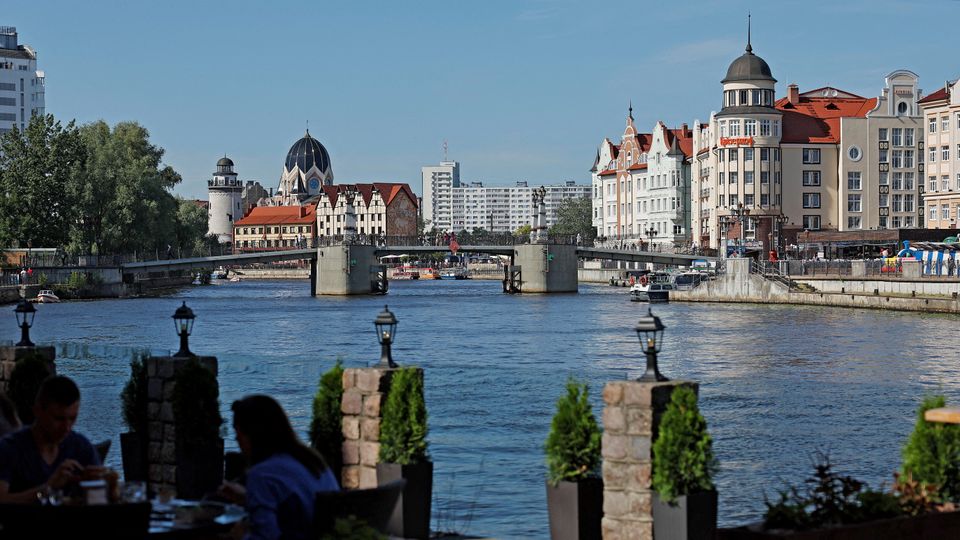EU Sanctions Commission to Allow Russia to Resume Transports to Kaliningrad

The Russian exclave of Kaliningrad
Foto:Vitaly Nevar / REUTERS
It is a dispute that goes beyond a mere confrontation between the European Union and Russia. Should Moscow be allowed to transport goods like steel and aluminum through EU member state Lithuania to the Russian exclave of Kaliningrad – even though those goods are on the sanctions list?
DER SPIEGEL has learned that the European Commission intends to publish a clarification on the issue in the coming days. Its key message will be that Moscow will be allowed to use the transit route for all goods, but only limited amounts.
The move will put an end to a disagreement that had not only been a significant source of tension between Russia and Brussels – but also exposed deep rifts within the EU regarding the correct approach to Moscow.
Since June 17, Lithuania has been blocking shipments of goods such as construction materials, metal and coal into Kaliningrad on the strength of EU sanctions imposed on Russia in response to the country’s invasion of Ukraine. The ban has affected the rail line between Moscow and Kaliningrad in addition to deliveries by road. Air and sea routes are not affected by the sanctions.
Comparable to Pre-Invasion Deliveries
In Russia’s view, it amounts to a "blockade," and it is criticized on a daily basis in the country. Indeed, an all-out military invasion has been among the responses discussed on state television.
The European Commission clarification expressly applies to all EU member states, but it mostly only affects the situation in Kaliningrad. According to the document, Russia will be allowed to transport sanctioned goods to Kaliningrad, but only in amounts comparable to pre-invasion deliveries.
The rule is designed to prevent products from being exported to other countries via Kaliningrad in violation of EU sanctions. Lithuanian customs documents are to be used to determine exactly how much Russia will be allowed to deliver to the exclave.
In special cases, such as for necessary repairs to waterway locks, the amount may be exceeded, say sources in Brussels. But Russia will have to justify each exception.
The policy that has been adopted by the Commission largely reflects the position of the German government. Berlin had been critical of the approach taken by Lithuania.
German Chancellor Olaf Scholz is eager to avoid unnecessary provocations of Russia. He has repeatedly emphasized that he would do everything in his power to ensure that NATO does not become a party to the war between Russia and Ukraine. German soldiers are stationed in Lithuania and could become involved in a possible conflict.
The rules for the transit of goods, Scholz said at the conclusion of recent NATO summit in Madrid, "must of course be established in light of the fact that this is about shipments between two parts of Russia." The comment made it clear that Berlin has a different interpretation of the legal situation than the government in Lithuania.
Cleared with the Commission
There are, however, good arguments for the Lithuanian position. Russia is exporting sanctioned goods into the EU and then exporting them further to Russia – which is forbidden by the sanctions. And the Lithuanians even cleared their position with the European Commission – at the technical level, as is now being emphasized.
That means that Commission officials had examined the legal situation and determined that Lithuania’s policy was the correct one. EU foreign policy chief Josep Borrell also said that the position of the Lithuanian government was consistent with the sanctions regime.
On the other hand, the issue of Kaliningrad was briefly addressed in March at a meeting of EU ambassadors focused on the fourth package of sanctions. The group was not of the opinion that transport between Russia and its exclave was affected by the sanctions.
Given the heated political situation, say Commission sources, an interpretation of the sanctions has now been found that ensures balance. During the negotiations over the sanctions, they say, it wasn’t possible to consider every single practical application of the punitive measures.
With this solution, the Commission hopes to provide Lithuania with a face-saving route to suspend its current blockade. Nevertheless, some in Vilnius are nevertheless viewing it as a defeat. "Russia has apparently managed to strike fear into the European Commission," says political scientist Dovilė Jakniūnaitė. "It is no longer about a few railway wagons. Now, it looks like threats are paying off for Russia."
Annoyance with Berlin
"It’s not us that changed position," is a statement heard frequently from sources close to the Lithuanian government these days. And discontent with Berlin is significant. "The Germans have been putting pressure on the EU Commission since June 18 to ensure that the sanctions do not apply to Kaliningrad," says a Lithuanian representative who is familiar with the negotiations. It’s unclear, say some, whether the German troops stationed in Lithuania as part of the NATO contingent would be available if Russia attacked the country or whether they would be withdrawn.
And it has already become apparent that Lithuania will bear the brunt of the consequences stemming from the conflict. "Russia has successfully sullied our reputation, says Jakniūnaitė. "And it won’t end there. Moscow will now take advantage of every opportunity to further divide the Europeans."
The consequence of the conflict with Moscow has already become apparent for Lithuanian’s rail carrier. Losses for the year are estimated at 150 million euros, and 2,000 of 9,000 employees are to be laid off.




